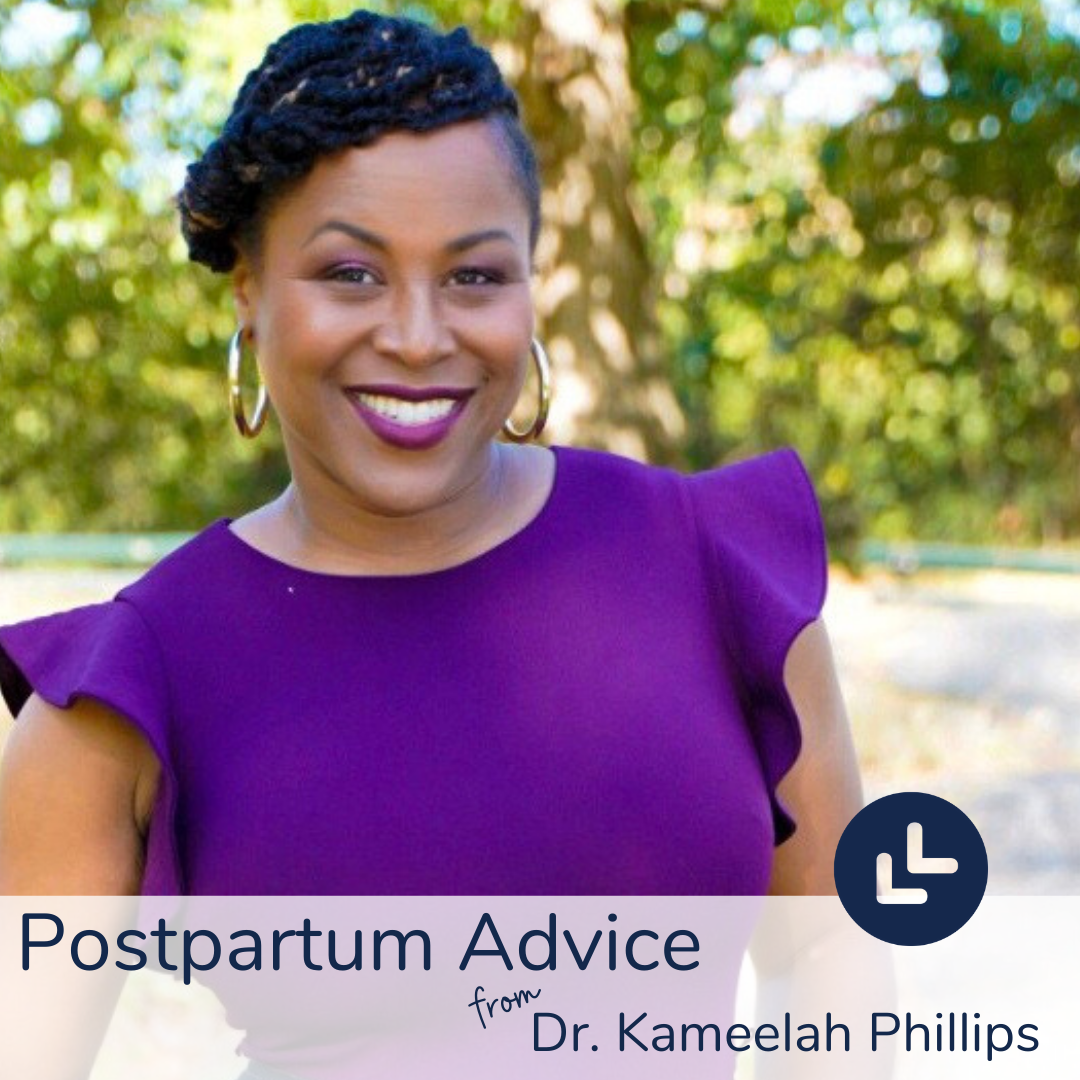Postpartum Advice For Moms

If you’re pregnant, you’ve probably bought all the baby books and signed up for the recommended birth education classes, but have you considered what’s in store for you postpartum?
It’s important you chat with your doctor about life after giving birth. But until then, check out this postpartum advice for moms from Dr. Kameelah Phillips, a New York-based board-certified OBGYN, wife, mother, and life-long women’s health advocate.
Postpartum: The Basics
First, new moms should know the postpartum period (the period of time after giving birth) lasts for about 6 to 8 weeks, but that time frame is fluid, Dr. Phillips said.
“Some women begin to feel ‘normal’ sooner and some need more time to physically recover. A C-section can also delay your return to normal activity,” she said.
And you know what they say about expectations …
“New moms should expect every day to be different than the last,” Dr. Phillips said. “It’s important to be flexible in your early postpartum life. Adjusting to life with a newborn, sleep deprivation, newborn feedings, a healing body, and whatever else is on your plate can be overwhelming.”
So what can help with the overwhelm?
“It’s important to ask for help and resist the urge to do everything on your own,” Dr. Phillips said.
Postpartum Advice For Experienced Moms
Dr. Phillips said every pregnancy and postpartum experience is different.
“I tend to see changes in recovery with the third baby, but this is purely anecdotal,” she said. “Every pregnancy is different, and because of this, it’s important to remain flexible if you are presented with issues.”
The Recovery Process
Dr. Phillips said most first-time moms are surprised by the recovery process.
“Many people underestimate how physical delivering a baby or having a C-section can be,” she said. “Regardless of how you deliver, it can take time to recover from delivery, and this includes allowing time for the vulva to reduce its swelling and for the skin to heal from a C-section.”
And Dr. Phillips said to have realistic expectations when it comes to fitting back into those pre-pregnancy jeans.
“Moms should not expect a miracle 'snap-back,’” she said. “I constantly remind my patients that it took 10 months to grow a human and they should have realistic expectations about how long it will take their bodies to return to normal.”
When To Call Your OB
Dr. Phillips said new moms should call their doctors if they experience pain that doesn’t subside after taking over-the-counter pain relievers such as Motrin or Tylenol.
If this happens, “call your doctor, especially if you’ve had a C-section, to make sure there are no infections or complications,” she said.
Postpartum Depression
New moms should also pay attention to their moods.
While intermittent crying or feelings of sadness are not uncommon in the first few days after delivery, Dr. Phillips said symptoms that do not resolve after two weeks could indicate postpartum depression and should be addressed by a physician.
Possible signs of postpartum depression include:
- Ongoing and/or worsening sadness, hopelessness, and crying
- Difficulty bonding with your newborn
- Withdrawal from friends and family
- Thoughts of self-harm or harming your baby
“Postpartum Depression is not a character flaw,” Dr. Phillips said. “It does not make you a bad mother. It doesn’t not mean you just need to get more sleep. This is a serious medical condition that should be addressed immediately.”
Related: Depression and Parenthood: Real Stories Every Parent Should Read
Postpartum Supplies
Dr. Phillips recommends the following supplies for optimal postpartum recovery:
- Extra-long pads (and plenty of them)
- Cold compresses (to help with vulva swelling associated with birth)
- A topical lidocaine gel for vaginal comfort
- Several nursing bras (if you plan to breastfeed)
- Several types of nipple cream (if you plan to breastfeed)
She also noted that women should have comfortable underwear that comes above their belly buttons.
“If you have a C-section, it is uncomfortable to have underwear that sits on the bikini line,” she said.
To Sum It Up
- The postpartum period–the period of time after giving birth– typically lasts about 6-8 weeks.
- Adjusting to life with a newborn, sleep deprivation, newborn feedings, a healing body, and whatever else is on your plate can be overwhelming, so ask for help and resist the urge to do everything on your own.
- The recovery process after giving birth can be uncomfortable, so allow plenty of time to heal.
- Call your doctor if, after giving birth, you experience pain that doesn’t subside with over-the-counter pain relievers or if you experience prolonged bouts of crying or sadness.
- Be sure to have postpartum supplies on hand, including extra-long pads, cold compresses, and topical lidocaine.
Experienced moms - what’s your take? How was your postpartum experience, and what postpartum advice would you give to new moms? Leave a comment on this blog post, or head to our Instagram to share your thoughts.


Leave a comment